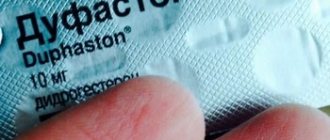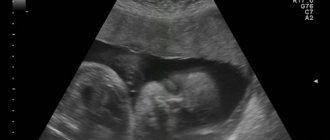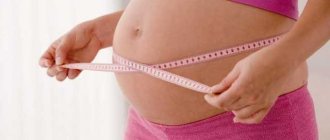When does your period come after childbirth?
When you ask a gynecologist this question, you will most likely receive a reasonable answer: “When breastfeeding ends.” Even if you breastfeed your child for two or three years (even if only on demand), the regular menstrual cycle will “wait” as long as necessary. This is exactly what happened in those days when there were no artificial formulas for newborns or they were unpopular: breastfeeding women simply forgot about menstruation for a year, two or more.
Modern mothers usually do not strive for such a result, continuing breastfeeding until the child reaches 6-12 months, and starting from 4-5 months, complementary feeding is gradually introduced. In addition, the onset of menstruation after childbirth can be affected by the use of hormonal contraceptives, so it is hardly possible to determine absolutely exactly when menstruation begins after childbirth without considering the specific situation. For one woman, this process may begin after 3-4 months, for another - after 3 years.
Will the young mother’s body quickly return to normal? This depends on many reasons:
- woman's age;
- how healthy she is and whether she has any concomitant pathologies;
- whether she is breastfeeding and how lactation proceeds;
- how pregnancy and childbirth proceeded.
Problems with the menstrual cycle can occur when:
- slowing down the process of uterine involution;
- in a weakened state of the body (for example, due to a short break between births);
- first late birth (after 30 years);
- complicated birth history.
When does the menstrual cycle return during breastfeeding?
For the majority of breastfeeding women, during lactation, menstruation resumes a year or a year and a half after childbirth, and in about a third, after 7–12 months2. For some young mothers, menstruation begins 3-6 months after birth2,3, in rare cases it does not come for more than 2 years3. If your periods are irregular for a long time while breastfeeding, it is recommended to consult a doctor.
Up to contents
How to understand that your period has really started after childbirth
A woman who has given birth should not worry if in the first two months menstruation is slightly delayed or occurs a little early, because during this period the body re-regulates the cycle.
Also, you should not trust myths about the onset of your first period. For example, the fact that the normalization of the menstrual cycle directly depends on the method in which the birth was carried out. In fact, there is no direct relationship between the onset of menstruation and whether the child was born via cesarean section or physiological birth.
But the fact that after childbirth most women get rid of menstrual pain really does occur. In some cases, this is quite simple to explain: for example, if pain in the pelvic organs was associated with a bent uterus, then the cause of this was a violation of the outflow of blood. After childbirth, the organs of the abdominal cavity slightly changed their location and at the same time the bend of the uterus, as a rule, straightens. As a result, blood flow is normalized and the pain goes away.
Some young mothers mistake for menstruation not menstrual discharge, but postpartum lochia - discharge of mucus slightly mixed with blood. However, lochia is not yet menstruation, but the consequences of injury to the uterine membranes. The color of lochia is deep red, and it remains that way for several postpartum days. Within a week, the volume of lochia decreases and their color darkens, even brown: these signs indicate that the uterine mucosa is healing. The discharge of lochia can continue longer, up to two months of the postpartum period. Then this process stops, and the body begins to prepare for the onset of the first menstruation or for the next pregnancy.
Can a breastfeeding mother get pregnant again?
Yes, this is quite possible, even without the onset of the first menstruation. The fact is that immediately after maturation, the egg leaves the ovary: this process of ovulation occurs approximately two weeks before the arrival of menstruation. That is, a woman can become pregnant both before and after ovulation. This means that your period may simply not arrive in time.
It is quite difficult to recognize the signs of pregnancy when a woman is breastfeeding. And in the early stages it is almost impossible to do this. Indeed, during breastfeeding, the menstrual cycle may be completely absent and not entirely stable. Nausea or frequent urination may be associated with poisoning or urological problems; darkening of the nipple area may indicate the consequences of a past pregnancy. Therefore, if you did not plan to get pregnant so quickly, you should not rely on the lactational amenorrhea method; it is better to try to use reliable contraceptives.
Cycle changes
For women, a delay is a reason to panic, but periods after breastfeeding will no longer be the same as before childbirth. The body has undergone internal changes, and delay may be a sign of slight hormonal imbalance. If one month they last 5 days, and the next - 3, there is no need to worry.
The cervical canal expands after childbirth, so there is no need to panic when your periods come heavier than before. At first, the body will rebuild itself, and only after 9-11 months will the cycle be restored. For some, it may recover within a year. It all depends on the characteristics of the body and how long after birth the mother breastfed the baby.
Some people worry that their periods will only come after a year. The reason for their long-term absence may be lactation - this is a natural process. There is no specific recovery period for the cycle, since everything happens individually for each woman.
Breastfeeding is very important for a child, especially at first, when he is still very weak. Do not deprive your baby of your breast, even if your period comes earlier than you expected. Nothing can be healthier for a child than breast milk.
The menstrual cycle is back to normal: is this true?
The menstrual cycle after childbirth is restored naturally and gradually, and this period lasts about two months. The first changes affecting the body of a young mother occur in the reproductive, endocrine, cardiovascular and nervous systems. In this case, changes also affect the mammary glands and the uterus, which experiences involution - reverse development.
Involution of the uterus occurs in a certain sequence:
- The uterine fundus descends (within 12 days);
- the uterus decreases in size (within 2 months);
- the uterus reduces its weight to 50 grams (before birth it weighed about 400 grams);
- the internal os of the uterus is formed (within one and a half weeks);
- the external os of the uterus closes, taking the shape of a slit (within three weeks);
- the internal mucous membrane of the uterine body, the endometrium, is restored (within two months).
The rate of uterine involution is influenced by the woman’s age, her state of health during pregnancy and after childbirth, and whether the woman is breastfeeding or using artificial formula. The involution process can slow down if a woman’s body is weakened by repeated childbirth with a short break in time, if the young mother does not take care of her sleep and rest schedule.
Menstruation while breastfeeding
When can a nursing mother resume menstruation after childbirth?
The timing of the restoration of the menstrual cycle for each woman is purely individual. The restoration of menstruation directly depends on the woman’s hormonal background, so the time norm can vary significantly.
For most breastfeeding mothers, the menstrual cycle is restored between 6 and 24 months of the baby. [3]
During breastfeeding, the anterior lobe of the pituitary gland produces the hormone prolactin, which inhibits the maturation of the egg and, consequently, ovulation, so menstruation does not come. However, if any changes occur in the organization of breastfeeding, for example, the mother begins to feed the baby less than 8-12 times a day, or introduces supplementary feeding, complementary foods, or switches the child to mixed or artificial feeding, then the level of prolactin in the blood serum decreases and, Accordingly, the likelihood of ovulation and the resumption of menstruation increases.
According to the International Dairy League (La Leche League International), the menstrual cycle in mothers who feed their babies on demand and introduce timely complementary foods to their children often resumes between the eighth and ninth months after birth. In this case, the new cycle may differ from the menstrual cycle that was before pregnancy. It may be longer or shorter compared to the previous one [3]. The nature of menstruation may also change - for example, they may become less painful, which is explained by a more physiological position of the uterus after childbirth, if there was a bend of the uterus before pregnancy.
After the first menstruation has arrived, you can expect a restoration of the cycle. This happens individually for each mother; for some, a full regular cycle is restored within 2-3 months, and for others over a longer period.
In any case, if you have the slightest doubt about the menstrual cycle after childbirth, you should consult a gynecologist.
Does menstruation affect milk supply?
Due to hormonal changes during menstruation, some mothers may experience a slight decrease in milk supply [1]. Babies may become fussier at the breast because the milk flows slower than usual. Fortunately, these changes do not last long and within 2-3 days after the onset of menstruation, lactation again increases to the desired level [2], in addition, children most often already receive solid foods to compensate for the lack of nutrition.
According to the International Dairy League, a daily dose of 500 to 1000 mg of calcium and magnesium taken (as recommended by a physician) from mid-cycle to the second or third day after the start of the cycle can minimize any reduction in milk supply [3].
However, based on experience, most often the appearance of menstruation in the mother goes unnoticed by the babies, and lactation remains unchanged. You may want to pay attention to other possible reasons for changes in your milk supply.
Is it true that the taste and smell of breast milk changes during menstruation?
This question is often asked by nursing mothers. There are indeed observations that, as strange as it may be, some babies become more restless and begin to refuse the breast at the beginning of the mother's menstruation. Ruth Lawrence, MD, reports that “complete rejection of both breasts may occur due to the return of menstruation. The mother will notice that the baby will refuse the breast for a day or so each menstrual cycle.” [2]
However, there is currently no confirmed data on changes in the taste and smell of milk during the onset of menstruation in a nursing mother. Therefore, we can assume that the child behaves differently at the breast than before for other reasons.
Does the resumption of menstruation mean the end of lactation?
The resumption of the menstrual cycle during lactation is a type of normal. Previously, as a rule, women did not have menstruation during lactation, but in recent decades, due to the fact that many women take hormonal contraceptives, stress accumulates, environmental conditions change, etc., the menstrual cycle is often restored before the end of breastfeeding, while milk - is still produced in sufficient quantities and the baby is fully breastfed.
Can breastfeeding sensations change during menstruation?
Some moms report feeling tired when breastfeeding around the time they get their period. But usually these sensations pass within one or two days. [2] Sometimes mothers note that their sensations change as menstruation approaches. For example, the breasts may become enlarged and the nipples may react painfully to the baby’s sucking during ovulation.
Also, sometimes mothers describe their breasts as full, hard and painfully sensitive to touch. Premenstrual breast pain is a cyclical feeling of intense fullness and tenderness that usually occurs in the period leading up to menstruation due to the fact that the breasts are filled with blood and lymph. In this case, pain may be felt during feeding or between feedings. This is a completely normal feeling for many women. Symptoms usually disappear soon after menstruation occurs. [2]
Literature:
- Breastfeeding and Human Lactation (Jones and Bartlett Series in Breastfeeding/Human Lactation) by Jan Riordan Publisher: Jones and Bartlett Publishers, 3rd Edition, 2004. Pages: 819
- Mohrbacher N., Stock J., La Leche League International, The Breastfeeding Answer Book, Third Revised Edition, 2008
- Wiessinger Diane, The Womanly Art of Breastfeeding. – 8th ed. / Diane Wiessenger, Diana West, and Teresa Pitman, 2010
Alena Korotkova, clinical psychologist, lactation consultant
Alena Lukyanchuk Psychologist, lactation consultant, member of ILCA (The International Lactation Consultant Association).
What can affect the onset of menstruation after childbirth?
As a rule, the arrival of the first postpartum menstruation may be delayed if a woman is seriously ill, her hormone levels do not return to normal, or she often experiences stress. However, the main reason among all the reasons for the arrival of menstruation is the duration of lactation.
- If for a year after giving birth a woman exclusively breastfeeds her baby without using complementary foods, then the first menstruation should be expected after lactation is completed.
- If the baby is already one year old, and the mother continues to breastfeed, then menstruation may begin while lactation continues.
- When lactation is not completely complete, and the mother supplements the baby with infant formula and introduces complementary foods early, the first postpartum menstruation can come within 3-5 months, despite the fact that breastfeeding has not yet stopped. Indeed, with incomplete lactation, the hormone prolactin, which regulates the arrival of menstruation through its effect on the ovaries, is produced in smaller quantities. And this means that menstruation can come much earlier than with breastfeeding without complementary foods.
- If a woman does not breastfeed, and the baby has been fed formula milk since birth, then the first period should be expected one and a half to two months after birth.
What is lochia?
Lochia should be distinguished from heavy first periods after childbirth. Lochia is profuse bleeding from the vagina that begins immediately after childbirth. During them, the vagina gets rid of the thick layer of endometrium formed during pregnancy. They are usually dark red in color and full of bloody clots. Lochia is NOT menstruation, they should be considered as a sign of recovery of the body after childbirth. They usually last 24-36 days, i.e. 3-5 weeks. Over time, they become less abundant and change color: they become pink or transparent. Despite the similarities with menstruation, they should be distinguished. During lochia, there are also cramps, as during menstruation, because the uterus contracts, returning to its normal size and gets rid of excess endometrium. Lochia differs from menstruation in that it becomes lighter over time, while menstrual blood usually darkens towards the end of the cycle.
What to do when lochia occurs?
The bleeding is usually very heavy at first, and you will likely need special pads or panties for adults in the hospital. As the bleeding subsides, you can start using regular sanitary pads.
The body is weakened at this time, so it is especially important to monitor hygiene and change pads on time to avoid infection.
Don't use tampons until your doctor tells you to. When the lochia completely weakens and becomes lighter in color, you can switch to daily pads and wait for your first menstruation after childbirth.
We breastfeed according to a schedule and on demand: when will your period come?
When the menstrual cycle is completely normal, this is a signal that the body is ready for a new pregnancy.
But how to determine readiness to become pregnant when a woman is breastfeeding? After all, if there are no periods, there are no obvious signs that the body has truly recovered. In fact, a lot depends on the breastfeeding regimen.
The fact is that the hormone prolactin is produced exclusively during breastfeeding. As already mentioned, this hormone is not only “responsible” for lactation, but also has the ability to suppress the functions of the ovaries. However, if you feed your baby not on demand, but according to a schedule, then there will be interruptions in the production of prolactin. And in this case, the first menstruation may occur within a couple of months after birth - that is, at the same time as for a non-breastfeeding mother.
When feeding on demand, it will take about a year to restore the menstrual cycle, and your period will not come before this time. It should be remembered that the amount of prolactin will decrease quite quickly if you change the on-demand feeding scheme to a regimented method. In this case, the arrival of menstruation will accelerate.
Does the taste of milk change when the menstrual cycle returns?
Many women stop breastfeeding when their periods begin. This should not be done for the reason that these actions contribute to the cessation of lactation after a few days.
There is an opinion that during menstruation the taste of breast milk changes. Experts have proven that this is just a stereotype that is not reliable.
Tips for those mothers who started menstruation while breastfeeding.
- The taste of the milk produced does not change - continue to feed your baby the same way as before.
- Shower more often, as a woman's smell changes during her period, and children may refuse to feed for this reason.
- Try to be calm and avoid stress, as the child feels everything. If mom is nervous, he is worried too. This is accompanied by poor sleep and frequent crying.
It is impossible to stop feeding a child naturally, since this is the only way he strengthens his immunity and receives antibodies. The latter help him fight viruses coming from the environment. Do not listen to those who say that during menstruation the taste of milk changes. This is not so, although our grandmothers were sure of it.
If the baby refuses to breastfeed, you should resort to hygiene procedures more often, because sweat glands are located near the areola of the nipple. The taste may be specific due to the fact that it is mixed with the smell of sweat.










